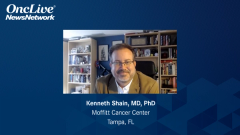
PORT Trial
Multiple myeloma expert Dr Kenneth Shain discusses the PORT study comparing central vs peripheral administration of melphalan flufenamide.
Kenneth Shain, MD, PhD: Another thing to think about with melphalan flufenamide or new therapies is that with dosing strategy, it’s a very attractive schedule when it comes to how it’s delivered. Every 4 weeks is a very attractive schedule, but it still only needs required central access. Patients need central access to get melphalan flufenamide. That means it’s a little different from most of the therapies we give in myeloma. We like peripheral IV [intravenous]. We like subcutaneous things. Those are things we’re used to. Our patients aren’t all that used to my experience, used to needing central access. That step is a little different from what we’re used to, but it happens all the time in oncology and is part of what we’re going to do.
What’s been designed and looked at is the PORT study, comparing the safety of peripheral access melphalan flufenamide vs the current administration of central access. At the IMW [International Myeloma Workshop] in 2021, the data suggest that it probably is going to be well received in the peripheral blood. Those things are going to need further analysis and further verification, but it’s very exciting when you think about its use.
Can we then move from central access to an easier peripheral IV access for this therapy? There are more data that need to be examined and crunched a little, but it’s a step in a nice direction. Thankfully, we have the patients and people who have the experience throughout the course of myeloma and other drugs of changing its formulation to make it much more accessible, easier, and frequently much safer for patients—ie, subcutaneous Velcade vs IV and subcutaneous daratumumab vs IV. Those are all things that hopefully can help us walk the same line, instead of going from central- to peripheral-access melphalan flufenamide. These are all things that can make important steps in the right direction. The PORT study is an important way to move to the next goal.
Transcript edited for clarity.







































